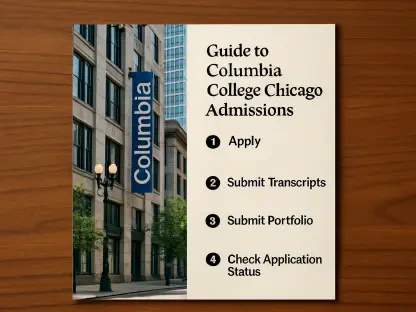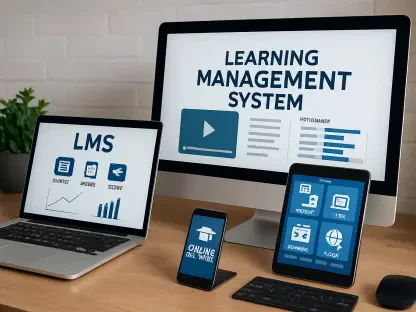In a world where education increasingly transcends borders, two Clemson University alumni, Taj Mack-Pete and Chloe Milkowski, are making remarkable strides through the Fulbright U.S. Student Program, carrying their passion for teaching to distant corners of the globe. Stationed in Taipei, Taiwan, and Galicia, Spain, respectively, these educators are not just teaching but immersing themselves in vibrant cultures, honing their skills, and building bridges of understanding. Their journeys, though separated by thousands of miles, reflect a shared commitment to personal growth and the transformative power of global education. As graduates of Clemson’s College of Education, they embody the university’s dedication to fostering intellectual curiosity and cross-cultural engagement, setting an inspiring example for future educators.
Their stories reveal the profound impact of stepping into unfamiliar environments with an open mind and a desire to connect, showing how such experiences can transform perspectives. Mack-Pete and Milkowski, through their distinct yet parallel paths, demonstrate how education can serve as a universal language, uniting diverse communities. Their selection for the prestigious Fulbright program highlights not only their individual talents but also the strength of Clemson’s mission to prepare globally-minded professionals ready to tackle the challenges of an interconnected world.
Personal Journeys and Cultural Immersion
Early Inspirations for Global Engagement
Taj Mack-Pete and Chloe Milkowski didn’t arrive at their Fulbright assignments by chance; their paths were shaped by formative experiences abroad that ignited a passion for cultural exploration. For Mack-Pete, transformative trips to Egypt and Japan, spurred by a family connection to military life in Okinawa, opened his eyes to the richness of different societies. These journeys planted the seeds for a career that would blend education with international engagement, ultimately leading him to Taipei. His early exposure to diverse ways of life fueled a determination to share his own culture while learning from others, a mindset that defines his approach in Taiwan. This background of travel and curiosity became a cornerstone of his ambition to teach in a global context, pushing him to seek opportunities like the Fulbright program where he could fully immerse himself in a new cultural landscape.
Chloe Milkowski’s journey to Galicia, Spain, was similarly influenced by past international experiences that broadened her worldview, shaping her perspective in profound ways. A study abroad stint in Italy during her time at Clemson introduced her to the joys and challenges of living in a foreign land, sparking an enduring fascination with cultural exchange. That experience taught her the value of adaptability and the importance of connecting with others through shared learning, lessons she now applies in Spain’s plurilingual schools. Her time in Italy instilled a deep appreciation for how education can break down barriers, motivating her to pursue a Fulbright role where she could teach English while embracing the local history and traditions of A Coruña. Milkowski’s story underscores how early global encounters can shape an educator’s mission to foster understanding in diverse settings, preparing her to navigate the complexities of teaching abroad with confidence and enthusiasm.
Roots of a Global Mindset
Mack-Pete’s personal history adds another layer to his international journey, as he became the first in his family to graduate from a four-year college and travel abroad extensively. This milestone imbued his Fulbright role with a profound sense of purpose, driven by memories of a childhood teacher whose kindness inspired him to pay it forward. In Taipei, he seeks to replicate that impact by integrating Taiwanese culture into his lessons, ensuring that learning becomes a mutual exchange rather than a one-way street. His background fuels a trailblazing spirit, positioning him as a role model for students and fellow educators who might see global opportunities as out of reach. This personal drive transforms his teaching into a mission of empowerment, showing how individual stories can resonate in a classroom thousands of miles from home.
Milkowski, on the other hand, brings a unique perspective shaped by her grounding in bilingual education, honed through student teaching at a language academy in Greenville, South Carolina. This foundation prepared her for the linguistic diversity of Galicia, where she eagerly engages with local history, from ancient landmarks to regional customs. Her enthusiasm for cultural immersion extends beyond the classroom, as she views every interaction as a chance to deepen her connection to the community. Unlike Mack-Pete’s focus on pioneering new paths, Milkowski’s approach centers on weaving her existing skills into the fabric of a new environment, demonstrating how prior training can enhance global teaching roles. Her journey reflects a balance of preparation and curiosity, highlighting the varied ways educators adapt their backgrounds to international contexts.
Commitment to Education as a Cultural Bridge
Teaching Strategies in Diverse Contexts
Taj Mack-Pete’s approach in Taiwan centers on fostering community through innovative educational methods tailored to his students’ environment, ensuring a unique blend of local and international influences. Drawing from his background as an elementary education graduate and Call Me MiSTER® alumnus, he emphasizes service-learning projects that encourage Taiwanese students to engage actively with their surroundings while introducing elements of American traditions. This dual focus ensures that his teaching resonates with local values while offering fresh perspectives, creating a dynamic classroom atmosphere. His strategy reflects a broader vision of education as a tool for mutual understanding, where students and teachers alike learn from each other’s experiences. By prioritizing cultural integration, Mack-Pete aims to leave a lasting impact on his students, equipping them with skills and insights that transcend geographical boundaries.
Chloe Milkowski, teaching in Galicia’s plurilingual schools, employs a unique yet equally impactful method through Content and Language Integrated Learning (CLIL). This approach allows her to teach English while embedding subject content, ensuring that language acquisition occurs naturally within the context of other lessons. Her strategy is particularly suited to the region’s emphasis on multilingual education, enabling her to connect with students on multiple levels. Milkowski’s focus on blending language and content fosters an environment where cultural exchange is seamless, as students learn not just a new language but also new ways of thinking. Her dedication to this method highlights how tailored teaching practices can address specific cultural and educational needs, reinforcing the idea that education can serve as a powerful conduit for bridging diverse worlds.
Building Connections Through Shared Learning
Beyond specific methodologies, Mack-Pete’s work in Taipei underscores a deep commitment to building personal connections with his students as a means of cultural exchange. By sharing stories of American life and encouraging students to reflect on their own traditions, he creates a dialogue that enriches both parties. This relational approach transforms his classroom into a space of shared discovery, where education becomes more than just academic—it’s a celebration of diversity. His efforts to involve students in community-focused initiatives further amplify this connection, ensuring that learning extends into real-world applications. Such dedication illustrates how educators can use personal engagement to dismantle cultural barriers, fostering a sense of global community one interaction at a time.
Milkowski’s efforts in Spain complement this idea by focusing on how education can anchor students in their own heritage while opening doors to new perspectives. Her enthusiasm for local history, such as exploring iconic sites in A Coruña, informs her teaching, allowing her to weave Galician culture into her English lessons. This approach not only makes learning more relevant to her students but also deepens her own understanding of the region, creating a reciprocal bond. Unlike Mack-Pete’s emphasis on personal storytelling, Milkowski prioritizes cultural landmarks as teaching tools, showing how physical spaces can enhance educational narratives. Her work exemplifies the potential of place-based learning to strengthen cultural ties, proving that education can be a collaborative journey rooted in the unique identity of a community.
Overcoming Challenges Abroad
Navigating Language and Cultural Barriers
Language barriers present significant hurdles for Taj Mack-Pete in Taipei, where the strong local dialect challenges even his years of studying Chinese since fourth grade, but rather than viewing this as a setback, he embraces it as a chance for growth. He prepares through language camps and digital tools like Duolingo to bridge the communication gap. His proactive stance reflects a broader mindset of resilience, recognizing that mastering the nuances of language is key to connecting with his students and their families. This dedication to overcoming linguistic challenges ensures that his teaching remains effective, even in an environment where every conversation requires extra effort. Mack-Pete’s journey highlights how such obstacles, when approached with determination, can become powerful catalysts for personal and professional development in international settings.
Chloe Milkowski faces a similar yet distinct challenge in Galicia, where her conversational Spanish encounters the unfamiliar terrain of the Galician dialect, presenting a unique opportunity for growth. Far from being deterred, she finds excitement in navigating everyday interactions, from grocery shopping to classroom discussions, as opportunities to refine her skills. Her enthusiasm for these small victories reveals a mindset that views language barriers not as walls but as doorways to deeper cultural understanding. Unlike Mack-Pete’s structured preparation, Milkowski’s approach relies on spontaneous learning, adapting to the dialect through immersion in daily life. Her experience underscores the importance of flexibility when teaching abroad, showing that linguistic challenges can enrich an educator’s perspective by fostering empathy and patience in communication.
Adapting to New Cultural Norms
Beyond language, Mack-Pete must also navigate the cultural norms of Taipei, a bustling urban setting that contrasts sharply with his previous experiences. Understanding local customs and social expectations becomes as crucial as lesson planning, requiring him to observe and adapt continuously to avoid misunderstandings. His willingness to step outside his comfort zone, whether through participating in community events or adjusting his teaching style to align with Taiwanese values, demonstrates a profound respect for his host culture. This adaptability ensures that his presence as an educator enhances rather than disrupts the local environment, creating a harmonious exchange. Such cultural sensitivity proves essential for any teacher abroad, illustrating how flexibility in behavior can build trust and rapport in unfamiliar settings.
Milkowski, stationed in the historic coastal region of A Coruña, encounters a unique set of cultural nuances that shape her teaching experience in profound ways. Embracing Galicia’s rich traditions and slower-paced lifestyle requires her to adjust her expectations and methods, balancing her role as an educator with that of a learner of local customs. Her curiosity about regional history and traditions, distinct from Mack-Pete’s focus on urban adaptation, informs how she connects with students and community members alike. This immersion in cultural context allows her to tailor her lessons in ways that resonate deeply, fostering a classroom environment where mutual respect thrives. Her story emphasizes that adapting to cultural norms is not just about fitting in but about enriching the educational experience through authentic engagement with a new way of life.
Shaping Future Career Paths
Expanding Professional Horizons
The Fulbright experience is proving to be a pivotal chapter for Taj Mack-Pete, shaping his long-term professional aspirations in meaningful ways. His time in Taiwan serves as a stepping stone toward earning an English for Speakers of Other Languages (ESOL) certification, a credential that will expand his ability to teach diverse student populations. This goal reflects a strategic vision, recognizing that skills honed in an international context can translate to impactful roles back home or abroad. The challenges and successes he encounters in Taipei are building a foundation for a career dedicated to inclusive education, equipping him with tools to address linguistic and cultural diversity in any classroom. Mack-Pete’s trajectory illustrates how global programs like Fulbright can act as catalysts for professional growth, opening doors to specialized fields that meet the needs of an interconnected world.
Chloe Milkowski’s time in Spain is similarly influencing her career outlook, though her path remains more fluid and open to exploration than ever before. Initially inclined to follow her mother’s footsteps into school administration, she now finds herself captivated by the possibilities of international teaching. The hands-on experience of working in Galicia’s plurilingual schools reveals new dimensions of education that challenge her original plans, prompting a reconsideration of where her true passion lies. Unlike Mack-Pete’s targeted pursuit of certification, Milkowski’s evolving perspective highlights the Fulbright program’s role in broadening horizons beyond predefined goals. Her journey suggests that exposure to global education can inspire educators to rethink their futures, embracing flexibility as they discover unexpected avenues for making a difference in diverse learning environments.
Long-Term Impact of Global Experiences
Mack-Pete’s immersion in Taiwan is not just about immediate teaching outcomes but also about cultivating a mindset that will influence his career for years to come. The cross-cultural competencies he develops—ranging from navigating language barriers to integrating local traditions into education—equip him to serve increasingly diverse student bodies wherever his path leads. This global perspective, shaped by real-world challenges, positions him as a leader capable of inspiring others to value cultural exchange in education. His experience underscores the lasting value of international programs in creating educators who can adapt to and thrive in varied contexts, ensuring that the lessons learned abroad continue to resonate in future endeavors. Such impact reflects the Fulbright program’s broader mission to foster skills that endure beyond a single assignment.
Milkowski’s evolving aspirations in Galicia also point to a deeper, long-term transformation driven by her global engagement. Her growing appreciation for international education suggests a potential shift toward roles that prioritize cultural and linguistic diversity, distinct from Mack-Pete’s focus on specific certifications. This openness to new possibilities highlights how Fulbright experiences can redefine professional identities, encouraging educators to remain adaptable in a rapidly changing field. The skills and insights gained from teaching in Spain will likely inform her approach to education, whether she remains abroad or returns to a domestic setting. Her story emphasizes that the true value of such programs lies in their ability to plant seeds of change, prompting educators to carry forward a global outlook that enriches every classroom they enter, shaping their contributions to education for the long haul.
Reflecting on a Global Mission
Lessons Learned from Distant Shores
Looking back, the journeys of Taj Mack-Pete and Chloe Milkowski through the Fulbright U.S. Student Program stand as powerful testaments to the value of global education, showing how such experiences can profoundly impact personal and professional growth. Their time in Taiwan and Spain, respectively, demonstrated how stepping into unfamiliar cultures could sharpen teaching skills while fostering significant personal development. Each challenge they faced, from language barriers to cultural adjustments, became a lesson in resilience and adaptability, shaping them into educators capable of connecting with diverse communities. Their distinct approaches—Mack-Pete’s service-learning focus and Milkowski’s innovative language methods—highlighted the varied ways education can bridge divides. As they navigated these international roles, their experiences affirmed Clemson University’s commitment to producing globally-minded professionals who can inspire change far beyond their home turf.
Future Steps for Global Educators
Moving forward, the stories of these Clemson alumni offer a roadmap for aspiring educators eager to make an impact on the world stage, highlighting the importance of embracing international opportunities. Embracing programs like Fulbright can provide invaluable opportunities to develop cross-cultural skills, preparing teachers to meet the needs of an interconnected society. Educational institutions should continue to support such initiatives, ensuring that more individuals gain access to transformative experiences abroad. Additionally, fostering mentorship and resources for language and cultural training can help future participants overcome inevitable challenges with confidence. The legacy of Mack-Pete and Milkowski serves as a call to action for educators everywhere to seek out global opportunities, recognizing that the insights gained from teaching in diverse settings can redefine careers and enrich communities for generations to come.









